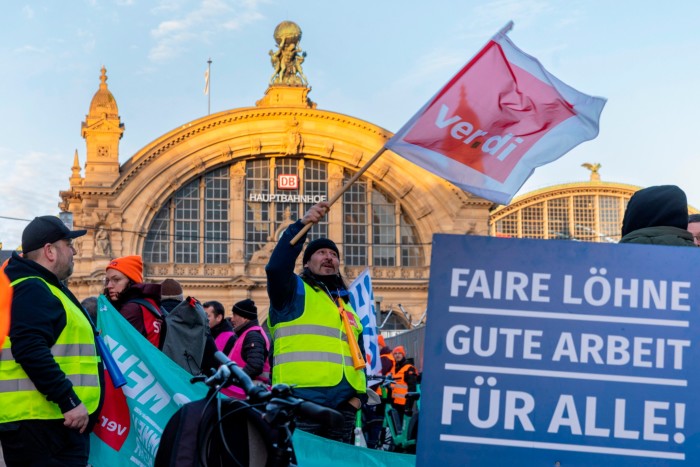Germany’s transport system was paralysed on Monday by a one-day warning strike that brought national and local rail services to a standstill, causing misery for millions of commuters and severely disrupting freight traffic in Europe’s largest economy.
The 24-hour strike, which began at midnight on Sunday, was called by powerful service sector union Verdi and the EVG, which represents rail workers. They say employers are ignoring the effects the escalating cost of living crisis is having on their members.
“What is actually putting a strain on public sector employees, and indeed all middle income groups, is the huge increases in the price of gas, electricity and food,” said Frank Werneke, head of Verdi. German household energy prices have risen 32 per cent in the year to February, while food prices are up by 22 per cent, according to figures from the federal statistics office.
Employers say the strikes are straining ongoing wage negotiations, with ADV, the German airports association, calling the strike an “unprecedented escalation”.
“It’s not acceptable for Verdi to act out its wage demands at the expense of the whole German economy,” said Markus Jerger, head of the German Association of Small- and Medium-sized Enterprises.
Demands for higher wages are also causing problems for the European Central Bank’s wage-setters, raising concern about the risk of a self-sustaining spiral of higher wages and prices.
Hourly labour costs in the eurozone overtook those in the US in the year to the final quarter of 2022, when they rose 5.7 per cent — the fastest rate since such data started to be collected for the single currency bloc in 2010.
All domestic flights were cancelled as some of Germany’s largest airports shut their doors, leaving 380,000 passengers grounded. All long-distance, regional and local trains operated by Deutsche Bahn were also affected, while public transport ground to a halt in seven of Germany’s 16 federal regions.
Long-distance, regional and local trains operated by Deutsche Bahn and other railways would also come to a standstill, EVG said.

EVG and Verdi, which is demanding a raise of 10.5 per cent for public sector workers, are using the strike to step up pressure during wage negotiations with employers. Talks are continuing between unions and public sector employer representatives on Monday.
“People are fed up,” Werneke told German radio, “particularly in public transport and in the airports where they don’t earn much. All they hear from their employers is warm words instead of a solution that takes inflation into account.” German train drivers earn about €40,000 a year on average, while airport baggage handlers earn around €30,000, according to recruitment website talent.com.
Monday’s strikes underline how workers across Europe are stepping up their demands for higher wages to compensate for the steep rise in the cost of living. Eurozone inflation was 8.5 per cent in the year to February.
German inflation is expected to rise from 9.3 per cent in February to 9.4 per cent in March when the latest pricing figures are released on Thursday.
ECB president Christine Lagarde warned last week about the risk of a “tit-for-tat dynamic” between companies and workers that pushes up profit margins and wages, increasing price pressures as both groups try to avoid a hit from higher inflation.
The ECB has raised interest rates six times by a total of 3.5 percentage points, but Joachim Nagel, head of the Bundesbank, told the Financial Times last week that more were needed, adding: “If we are to tame this stubborn inflation, we will have to be even more stubborn.”

